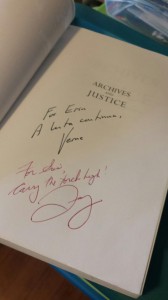There will be a lot written and said about Terry Cook following his passing yesterday. He was a Canadian archivist whose theories of appraisal have shaped archival theory. I suspect that his archival legacy will focus on his many contributions to the field. But while I deeply admire his writing and thinking, my memories of Terry revolve around his generosity of spirit.
My first introduction to Terry Cook was reading his article "The Archive(s) Is a Foreign Country: Historians, Archivists, and the Changing Archival Landscape" for a paper in my Introduction to Archives course. I have stars and "YES!" and exciting thoughts annotated throughout my copy of the article.
Later that fall, two colleagues and I reached out to him asking if he would moderate a panel we were proposing for SAA. Our collective research was around the intersection of archival practice and social justice activism and his work was foundational for all of us. When he courteously accepted our request he became more than an archival legend; he became a mentor to three young archival students on the cusp of becoming professionals and a friend whose passion for social justice nurtured our own.
We presented our panel In Pursuit of the Moral Imperative: Exploring Social Justice and Archives in August 2012. Nearly two years after the experience what I recall most vividly are the incredibly kind, welcoming, and supportive words that he used to introduce us. Following the panel we went to lunch with him and his old friend Verne Harris. Our conversation was invigorating and valuable. When we discussed archives-related topics, both Terry and Verne pushed us to think more deeply about the issues, questioned our assumptions, and validated our methods. But Terry also wished to know us as individuals with our own stories and to share a piece of himself with us. He was a man who wanted to encourage us because he recognized the vital importance of many perspectives in the world and in our profession. He had a gracious spirit whose own work did not diminish others' and who welcomed disagreement and discussion.
That day marks my entrance into this profession. His presence in that day has shaped my work and will continue to shape my thinking. My words seem inadequate to recognize the impact that day in particular, and Terry more specifically, has had on my life. So I end with a picture of his inscription to me in my copy of Verne Harris's book Archives and Justice, the forward of which was written by Terry.
 For Erin, Carry the torch high! Terry
For Erin, Carry the torch high! Terry








